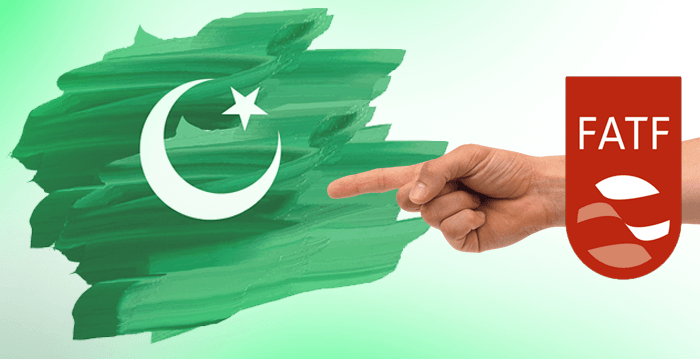Pakistan is not likely to be placed on the blacklist of the global financial body as the country has made enough progress to meet international anti-money laundering and terror financing standards, a brokerage said on Monday.
Topline Securities declared in a flash note;
“Since a comprehensive action plan has already been submitted, we believe that chances of Pakistan to be placed on the blacklist in the ongoing FATF (Financial Action Taskforce) meeting is least likely, contrary to the market expectations, as only countries that do not make sufficient progress or fail to provide an action plan are moved to the blacklist”.
“We also downplay concerns of an adverse impact on Pakistan’s economy due to its inclusion in the blacklist in case Pakistan fails to satisfy FATF.” It added.
Not to know, currently a Pakistani delegation is on a visit to Paris to attend FATF meeting that started on June 24 (Sunday).
In February, Pakistan barely escaped placement, however a senior official of the FATF confirmed that it will be placed on the FATF’s watch-list in June, the Express Tribune reported.
Must Read: JazzCash and National Bank of Pakistan to Service the Bureau of Emigration & Overseas Employment
According to Topline Securities “The week’s meetings will conclude with the third and final plenary meeting on 27-29 June, where they will officially place Pakistan on the Improving Global Anti-money Laundering (AML)/Countering Financing of Terrorism (CFT) compliance’s list, also known as the grey list”.
On Wednesday, Interim Finance Minister Dr Shamshad Akhtar put a strong case in front of FATF and requested to remove Pakistan from its grey list.
Those countries which has deficiencies in their financial system are placed on the category of greylist (ongoing process), while countries that are not making enough progress in addressing the deficiencies or have not dedicated to make an action plan are moved to blacklist and placed in the category of high-risk jurisdictions (public statement-call for action).
This list consists of authorities with strategic AML/CFT deficiencies for which they have made an action plan with the FATF.
For your information, FATF identifies jurisdictions with strategic AML/CFT lacks in its two public documents;
- FATF Public Statement (call for action)
- Improving Global AML/CFT Compliance and On-going Process
It is issued three times a year and interestingly FATF does not use greylist/blacklist terminologies though.
FATF decided to place the country on the greylist from June. In previous times (2008 and 2012) Pakistan was part of high-risk jurisdictions (blacklist), while in 2010 and 2014 it was under jurisdictions that were making sufficient progress (greylist). Then, in 2015 Pakistan was removed from the greylist.
Although FATF did not formally declare Pakistan’s position on the grey list, the US and the UK both moved the FATF in February, nominating Pakistan for placement on the grey list and were after joined by France and Germany.
Soon after, Pakistan was asked to propose a comprehensive action plan to be evaluated in the ongoing FATF meeting for opposing the financing of terrorism deficiencies.
Pakistan has put lots of efforts to confront financing terrorism and setting up anti-money laundering laws and in recent times it has addressed issues raised by the FATF on the tax amnesty scheme.
The National Security Committee restated its assurance to cooperate with the FATF On June 8, whereas Securities and Exchange Commission of Pakistan issued Anti-money Laundering and Countering Financing of Terrorism Regulations (2018) on Jun 20.
Though putting Pakistan in the blacklist may hurt its standing in the international landscape, it will not be as harsh as recently been portrayed. Topline Securities said.
“This is because when Pakistan was part of the greylist/blacklist (2008-2015), it successfully approached multilateral bodies, floated international bonds and had international trades.” It added.
At present, FATF has officially selected 10 countries under high-risk jurisdictions (blacklist) and jurisdictions that are making sufficient progress (greylist).
Following 8 countries are under FATF’s grey list:
- Ethiopia
- Iraq
- Serbia
- Sri Lanka
- Syria
- Tunisia
- Vanuatu
- Yemen
On the other hand, two countries under the blacklist are:
- Iran
- North Korea
In Paris FATF, Middle East and North Africa FATF are chairing 6-day joint plenary meetings to protect the integrity of the global financial system and to add value to safety and security around the globe. In these meetings delegations from the 203 jurisdictions of the FATF Global Network are involved including United Nations, International Monetary Fund, World Bank and other partners as well.




